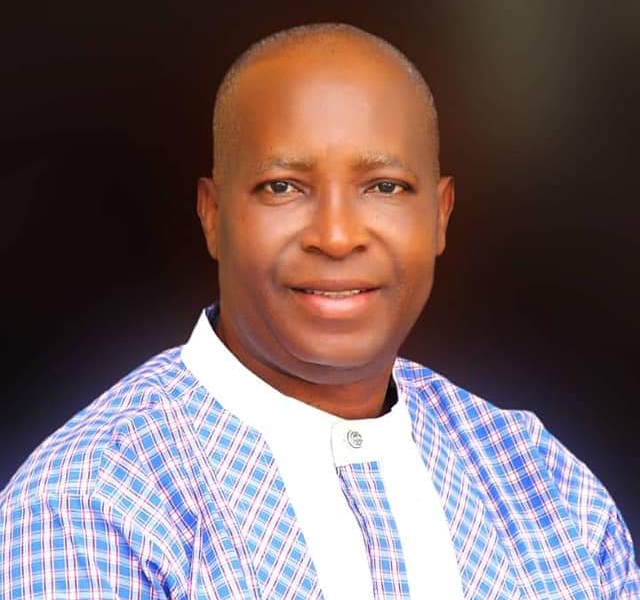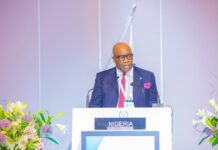Senator Bassey Albert, governorship candidate of YPP, Akwa Ibom state acknowledging cheers from a crowd of YPP supporters.
By Abasifreke Effiong
The popularity of the Young Progressives Party (YPP) in Akwa Ibom state has suddenly dwarfed the lead opposition party, All Progressives Congress. The YPP is inching bracingly towards terminating the 24 years reign of the ruling Peoples Democratic Party in 2023. The PDP is overwhelmed by the gale of defection of its officers to the YPP. The defection is already causing a panic disorder in the PDP.
The YPP is barely six months old in Akwa Ibom – counting from when the party hoisted its flag in the state – yet its acceptance, growth and visibility is revolutionary and exponential akin to the growth of the mustard seed. The mustard seed was the smallest seed, but it grew into a huge plant. In the parable of the mustard seed as recorded in Matthew, Mark and Luke’s accounts, Jesus Christ taught about the kingdom of God comparing it to the mustard seed. He said though it started small, with Jesus and the disciples, it would grow and spread to unlimited number of followers.
The acceptance YPP has received was unthought of. Akwa Ibom people are embracing the party, taking it to their homes, hamlets, units, villages, wards and every nook and cranny. The state publicity secretary of the party, Mr. Akan Emah said, “…the Young Progressives Party has been accepted by the generality of the people, so the people will speak for us, support us and vote for us during the elections”. The party has inaugurated offices in all the 31 local government areas. People are voluntarily donating their houses to be used as ward offices and meeting points. This is a sacrifice people rarely make in politics for a political party that is not in government.
The party is targeting young people who will be voting for the first in 2023. It is also harvesting quality membership from the APC, PDP, ADC and other political parties – the most coming from PDP. Between mid-July and last week, more than 750 officers of the PDP at the wards, chapters and state levels have defected to the YPP, joining its gubernatorial candidate, Senator Bassey Albert, and his running mate, Chief Asuquo Amba, a retired Assistant Inspector General of Police. Many political office holders, stalwarts and founding members of the PDP have also decamped to the YPP. This is the largest defection of serving officers of the PDP to any other party in the state since 1999. Last weekend, 53 serving chapter and ward officers of the African Democratic Congress also defected to the YPP. The former two term house of assembly member, Barr. Usenobong Akpabio had said “YPP is the fastest growing party in Akwa Ibom state.”
 A crowd of members and supporters of YPP at the reception of Senator Bassey Albert, governorship candidate of the party in Akwa Ibom State.
A crowd of members and supporters of YPP at the reception of Senator Bassey Albert, governorship candidate of the party in Akwa Ibom State.
There is an amusing irony about the defections from the PDP. When Senator Albert left the PDP, he was dismissed as inconsequential. Some PDP members said his exit won’t shake the party as much as the loud, intimidating, “uncommon defection” of Senator Godswill Akpabio on August 8, 2018. But it has turned out that Senator Albert’s defection has shaken the PDP’s stranglehold and weakened its grassroots base like never. The membership loss the PDP has suffered to the YPP has become a concern to members of the party. Those who thought the PDP was an indispensable ‘religion’ in Akwa Ibom are having a rethink and waking up to the reality. Ward officers are the party’s lifeblood. They are the “unsung heroes” and heroines whose contributions to the success of a party in an election cannot be undermined. Their mass defection to the YPP makes it uneasy to dismiss Albert’s voyage.
 Mr. Nyeneime Andy, Akwa Ibom State Chairman of YPP.
Mr. Nyeneime Andy, Akwa Ibom State Chairman of YPP.
The YPP is deliberately targeting the grassroots. Chief Amba, the deputy governorship candidate of the party gave the hint in his post-unveiling press conference. He said, “our magic wand is the grassroots”. The party is aiming at the grassroots, targeting young, resolute men and women, not old politicians. It is seeking to inculcate a mindset of volunteerism and common ownership among her members. The voluntary donation of assets to the party by members shows that the YPP is building itself upon the philosophy of common ownership. Common ownership is a socialist ideology. It is a way of neutralizing capital and “vesting control of an enterprise by virtue of participation in it”. In political philosophy, common ownership refers to “joint or collective ownership by all individuals in society”. It is a principle where members rather than being owners of an enterprise, are held to be trustees of it. Its underlying ideology is that members share a common assiduity towards a shared goal. A people who define their own goal, share the goal and pursue it are most likely revolutionary in mindset, they would be resistant to distraction and opposition.
YPP’s emergence in Akwa Ibom is like a sunrise – its rays came up suddenly, it is shining brilliantly, and its whipping scorch has woken those who had slumbered.

Chief Asuquo Amba, deputy governorship candidate, YPP, Akwa Ibom State.
The PDP in Akwa Ibom will have just more than the APC to face in the 2023 general elections – when the APC finally wriggles itself out from what seems like a cul-de-sac. The ruling party will have the YPP which is emerging as the lead opposition, and then the NNPP to contend with. Truly, it is not a sunrise as usual for the PDP. With the suffocating forgery allegations on the neck of its gubernatorial candidate, the party’s inability to reconcile aggrieved members and bad losers of the last primaries, and the on going gale of defection, it might just be a sunset for the PDP.
Beyond the mass defections, an implosion might be lurking at the corner in the party. Aspirants who lost the primaries in the party are still aggrieved and largely dissatisfied. Some of them have said that the leader of the party, Mr. Udom Emmanuel, is not serious about genuine reconciliation. Those who shared their experiences after meeting with the Senator Effiong Bob-led reconciliation committee said the committee did not outline any definite reconciliatory measures. One of them, a federal constituency aspirant said, “the reconciliation meeting was merely like a meet and greet”. James Iniama, one of the governorship aspirants corroborated this in an interview he granted Udeme Utip recently. He said, “we had that meeting…but I would say that we have not yet been reconciled.”
The mass defection hitting the PDP is not an happenstance. There were early-warning signs but the leadership ignored them with an air of presumptuousness as it has allegedly been ignoring wise counsels from its knowledgeable stakeholders. From the state to the wards, there are complaints of poor welfare, lopsided reward system, and leadership by cabal in the party. This is one of the premises for the high turnover of officers and members. And their defection speaks audibly to the people. A party that cannot cater for her own heroes would definitely do nothing for the people. In business and organisational communication, high turnover of workers from an organisation is a telltale sign of dissatisfaction, lost of faith, trust and confidence in the leadership, vision and future of the organisation. Mass turnover is an indication that an organisation is sick inside. A sick organisation rarely survives if the leadership fails to address the causes of the sickness, dissatisfaction, mistrust and loss of confidence.
While the PDP battles with its tonnes of baggage, and the APC, its self-destruction, it’s a sunrise for YPP.
















